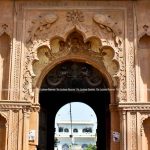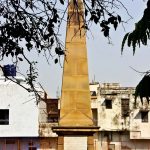Colvin Taluqdars’ College
Saga of Lucknow from the colonial era till the modern day
“Noblesse Oblige” the College motto in French could roughly be translated into “you are obliged to be noble at all times”. This was the moral that prompted Sir Auckland Colvin, Lieutenant Governor of the North West Provinces, while functioning as Lieutenant Governor of Avadh and Agra in 1889 to conceive the idea of a school with the object of imparting education to the children of the British administrators and the landed aristocracy who were known as Taluqdars. The concept of College was secular in nature, outlook and education. The idea was to inculcate democratic values and develop individuals of great valour and discipline for a society that contributes in nation building.

The central charge of the crest depicts a muscular right arm grasping a garb of wheat. The naked right arm is symbolic of industry or hard work. Wheat symbolizes faithfulness, while the garb of wheat symbolizes that the harvest of one’s hopes has been secured. The central charge is mounted on an open book, which is placed against a horizontal sword. The open book is a symbol of knowledge manifested and revealed, while the sword, in true knightly tradition symbolizes Justice and Military Honour.
The College Colours are azure and white. Azure signifies loyalty, chastity, truth, strength and faith. These are virtues that every student of the College should aspire to. Significantly, the College Motto is imprinted on the open book. Thus the chief manifestation of knowledge for every student of the College is the cardinal virtue that every Colvinian is obliged to be noble.
The College is situated on a huge land piece of 60 acres on the bank of River Gomti, right opposite the Canning College which is now known as Lucknow University. The College boasts of some of the finest playgrounds available in Lucknow in addition to Volleyball Court, Basket Ball Court, Tennis Court, Squash Court, Swimming Pool and separate Cricket, Football & Hockey grounds. The College also has the facilities for Horse-Riding. College had three residential hostels namely, Avadh, Anjuman & Hind that are complimented with separate mess and kitchens. There is also a provision of Dispensary facility for basic medical needs of the residential students as well as day- scholars. The College has a Greeko-Roman styled Assembly area that is rarely seen at any other educational seat. Currently Colvin Taluqdars’ College conducts the educational syllabus laid by ICSE/ISC (Indian School Certificate Examination) upto Grade 12 and house various facilities for Computer, Physics, Chemistry and Biology Laboratories.
The first Principal was Henry George Impey Siddons, the son of a Captain in the Indian Army, who graduated at Oxford and returned to India to teach. It was a result of real hard work from such people of determination and vision that made Colvin Taluqdars’ College a place that was considered at par with Aitchison College, Lahore and Mayo College, Ajmer. Till the year 1933, the College education was confined to the aristocracy, later in the year 1945 the College started Intermediate Science classes, however independent India saw the doors open for all who were looking for quality education and the place in itself was a status symbol and matter of pride for those whose children were enrolled there.

The theme of College culture has been emphasis on ‘being good and doing good’, which is the essence of all religious faiths. Despite the changing socio-political fabric of the country Colvin Taluqdars’ College has always remained an epitome of unity, integrity and social brotherhood. Something that stands a Colvinian (a term commonly an alumni is referred as) apart from others is the respect, affection and admiration that bonds the generations.
Even today, a student from Colvin Taluqdars’ College would proudly count on the greats that have earned a name and place for themselves in various walks of life. The College celebrates its Annual Sports and Alumni day known as Darbar Day on 23rd December to relive the grandeur and pristine glory of the past with trotting of horses and wallops of elephants, majesty of royal chhatri and the splendour of turahi and nagaaras. The Day marks a gathering of current students with an opportunity to interact with Old Colvinians and various sports activities take place to mark the occasion.
Colvin Taluqdars’ College represents the glorious past and the associated history that narrates the whole saga that Lucknow witnessed from the colonial era till the modern day. The educational seat of such a calibre needs a lot of government as well public support to save its grandeur and maintain the stature that it once enjoyed. I urge all the Old Colvinians to come forward to join the drive to salvage the pride of this great seat of education that produced numerous personalities from different fields.
Arqam Fazal Mirza
Writer is an alumni of Colvin Taluqdars’ College





